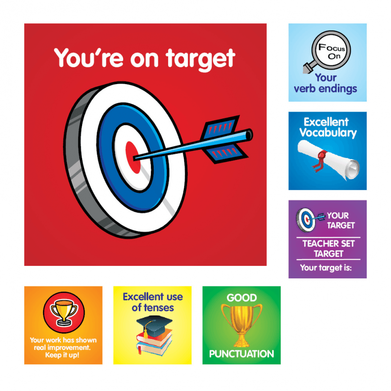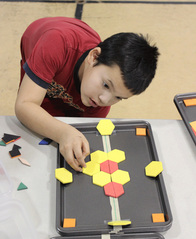Assessment Conversation
A university peer of my coach is now an instructional resource teacher with a focus on assessment K-12, and she and a colleague were co-facilitating a session on a project they are involved in with some teachers from the Simcoe board. More specifically, they are exploring the research-based notion that "feedback encourages learning, while grades only stifle it".

A challenge I have found this year while providing descriptive feedback in the absence of letter or number grades is the amount of time I am spending convincing both students and their families in some of my classes that feedback rather than marks is a good thing.
The last time I was in a classroom, I taught Grade 3. By Grades 7 & 8, students and their families have had a lot more time to become marks-dependent! And -- in fairness -- the provincial report card, with its emphasis on marks-based assessment, encourages this marks obsession. I feel like while these conversations are critical, they consume so much of my time, that my actual feedback ends up being less than stellar, as I am constantly racing against the clock to plan lessons and assessments and provide feedback to all my students effectively.
I asked our new colleagues how they handled the learned dependency on marks in the older grades.
Their response was that they were partnering with families so that parents who were on board could act as bridges to the community, and help communicate philosophy and research to other parents. They admitted that "unlearning" the marks dance was a challenge for some students, however they had found teachers who were on board so that students could experience a more feedback-centered classroom for more than a year at a time, and that this was making a positive difference.
They also agreed that the report card as it currently stands can act as a barrier to effective pedagogy and assessment practices. In fact, their team was working on creating a form with a check box for families to fill out if they did not wish to receive a report card. So many parents were happy with the descriptive feedback model now, and felt that they had a better grasp of what their children knew and could do and still needed to work on, that they no longer felt that a letter grade report card was necessary.
Having families document this more formally would help the team move forward in expanding the research next year, and having data on hand vis-a-vis the number of families for whom effective feedback had made the report card redundant will hopefully help them convince the powers that be to modify or eliminate the provincial report card in the future.
Personally, I am struggling with the chicken and egg conundrum: Would more effective teachers using effective instructional and assessment techniques make the report card redundant, or would a revised reporting model encourage more effective teaching and assessment/feedback?! I'm not sure what needs to come first, but I am sure that something needs to change!
I look forward to hearing more about this group's progress.

At lunch on Friday, I attended a session where a team from Rainy River shared their story of how a project to deepen teacher understanding of how young children learn math lead to developing strong ties between the school (where, we learned, 98% of the students were FN and 100% of the teachers were not) and the communities they served.
Reaching out to the community education counselor (apparently every FN community has one) ensured that the local families were on board for things like the math night the school put on, and ensured that the activities on that math night were culturally grounded (i.e. tangram clan animal quilt, locally prepared "feast" vs catered meal) to ensure community buy-in.
Partnering with FN educators also helped others on the team (and in the schools) move away from a deficit model in their perspective of the students who struggled, and instead begin to truly comprehend the richness to be found in the local culture.
We learned, for example, that the Ojibway language is a verb based language (whereas in the western world, we tend to take a rather static, or noun-based approach to teaching math), and that the number system itself helps learners develop a sense of number (their number system runs 1-10, then builds on to 1000). Also that many of the words for key math vocabulary actually have the concept already built into the language, for example, the word for rectangle is "elongated square".
Understanding this prompted the team to develop partnerships between math and FN language teachers, and we were intrigued with the video footage of kindergarten math-language lessons being co-taught by two educators from different "silos"!
It was interesting to see a team of highly trained, western, professional educators model humility as they demonstrated so many of their assumptions and celebrated their learning. It was clear that their mathematical project, which had set out to use their knowledge of cognitive science and spatial reasoning to develop a rich math program, had in addition led them to an understanding that bridge building with the community was a necessary and vital part of improving student learning. It was also clear that the Kindergarten students with whom they worked were not the only beneficiaries of this rich project!
Community Conversations
As I reflect on the success of the colleagues from whom I learned this past week, and consider the current challenges in the community right now with regards to things like the revised health curriculum, I realize that -- as much as ever -- communicating effectively with families and other community stakeholders is absolutely fundamental to everything we do in schools and classrooms.
While I continue to grow as a mathematician, I resolve to refocus on building community connections as well in the year ahead.


 RSS Feed
RSS Feed